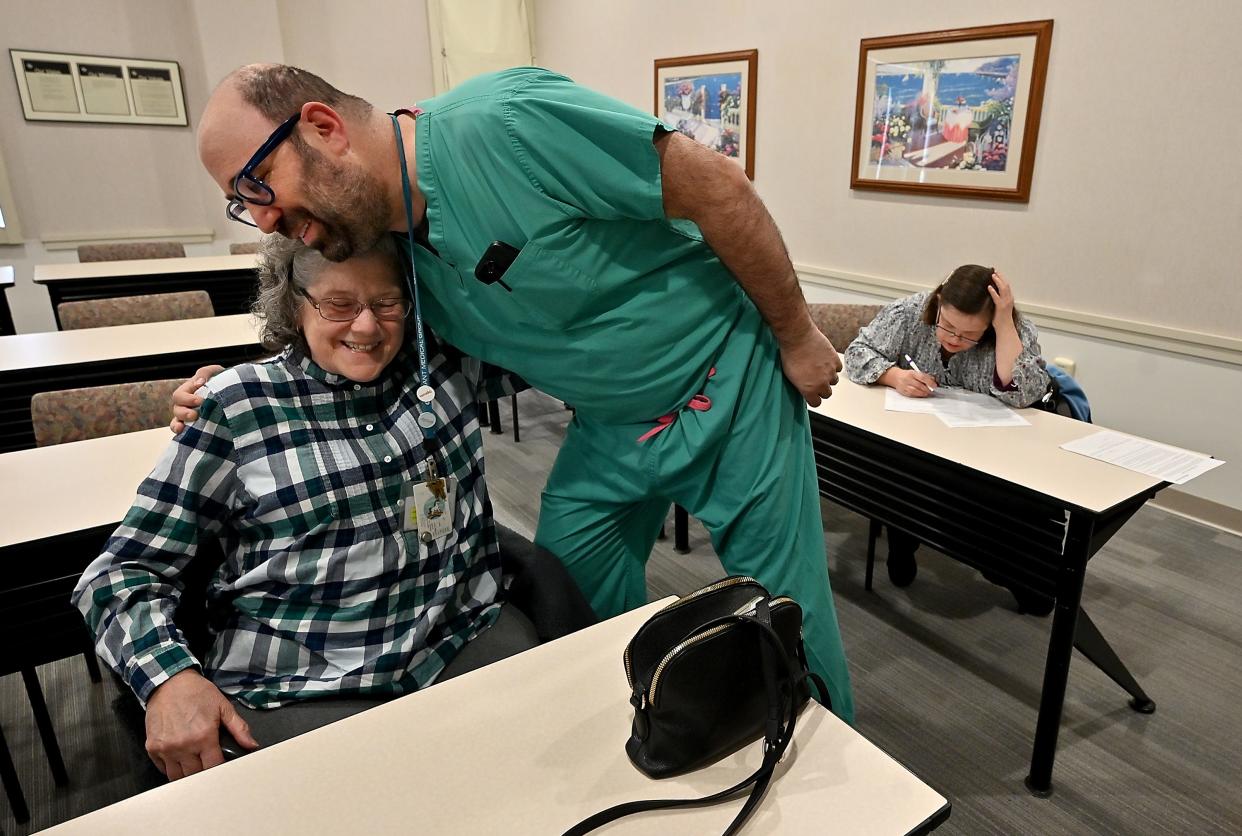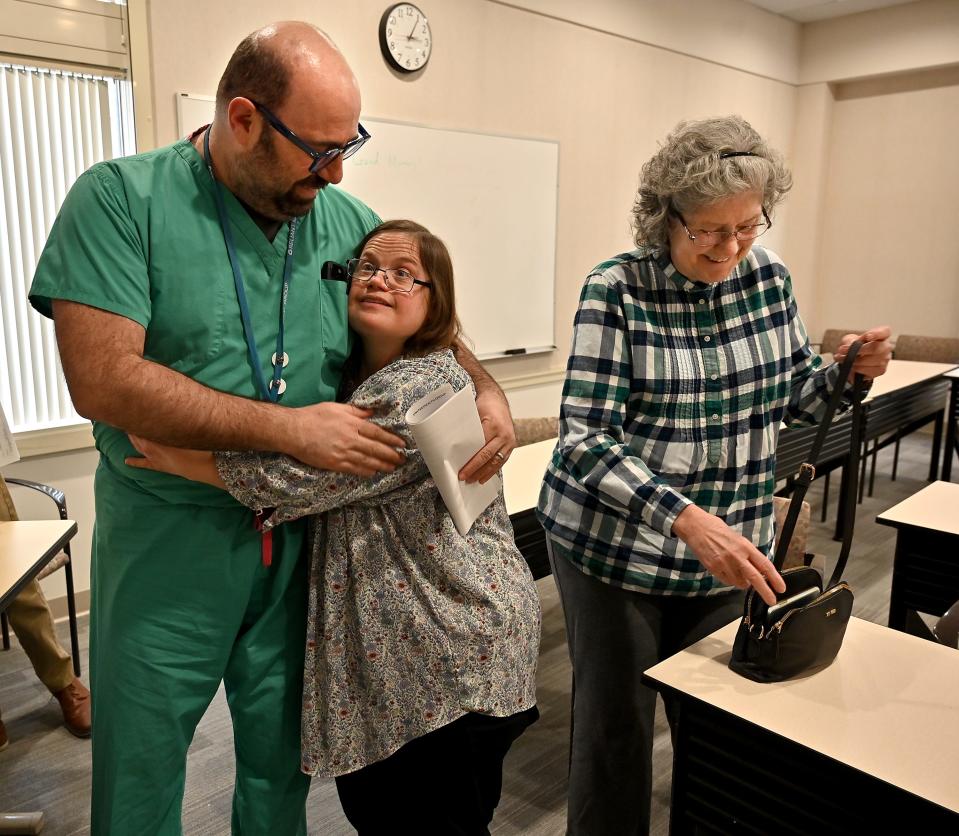Can't sleep? One therapy inspires some to get a good night's rest

WORCESTER — Do you have problems sleeping?
If the answer is yes, you’re not alone. Roughly 14% of adults in the U.S. — more than one of every 10 grownups — had trouble falling sleep most days or every day in the past 30 days, according to 2020 data from the U.S. Centers for Disease Control and Prevention. The percentage increases to nearly 18% for adults who have trouble staying asleep most days or every day in the past 30 days.
Include Oxford residents Marilyn Kent and her daughter, Karen, into those groups. Marilyn traces her sleep problems back to the 1980s, when her pattern of interrupted, overnight snoozing caused daily exhaustion.
Karen’s sleep wasn’t any better. Her problems started in the 1990s and she was equally exhausted during the day.
Both tried CPAP (continuous positive airway pressure), a common sleep therapy for millions of Americans. It didn’t work.
“It was terrible,” said Marilyn, one of many patients who complain they can’t sleep with the CPAP mask over their mouth.
Not getting enough sleep is linked to health problems, including type 2 diabetes, heart disease, obesity and depression. It also can lead to car crashes and mistakes at work, resulting in injuries.
Dr. Kass and Inspire to the rescue
Relief arrived from Dr. Jason Kass, an ear, nose and throat physician at St. Vincent Hospital whom Karen hugged when she and Marilyn recently met with Kass to talk about a surgical implant called Inspire. Mother and daughter got the implant, and Marilyn said it worked wonders.
“I sleep so solid. It’s amazing,” she said.
Developed by Minnesota-based Inspire Medical Systems Inc., Inspire is a battery pack implanted near the collarbone, and it has two wires. One stimulates nerves in the tongue, the other measures breathing.
A “tongue pacemaker” is how Kass described the technology. While sleeping, the tongue is pushed forward during every breath. The throat opens, as a result, and there is no breathing obstruction.
Inspire combats obstructive sleep apnea, a major sleep disorder that Marilyn and Karen suffered with for decades. This type of apnea relaxes the throat muscles and blocks the airway, and breathing repeatedly stops and starts while sleeping. The result is less oxygen to the brain, which triggers waking up to take a breath.
Inspire is the only FDA-approved therapy for obstructive sleep apnea that works inside the body. The FDA approved Inspire for adults 22 and older in 2014. Approval for 18- to 21-year-olds followed in 2019.
Intellectual disabilities: Higher rates of sleep problems
Last March, the FDA approved the technology for patients with Down syndrome between 13 and 18. Karen has Down syndrome, and she had the Inspire implanted by Kass in September.
She’s part of a population that traditionally experiences an increased level of sleep problems. Studies published by the National Institutes of Health indicate higher rates of sleep disturbances for people with intellectual and developmental disabilities (34% to 86%), compared to the general population (14%).
Researchers point to challenging behaviors, the use of psychotropic drugs, mental health conditions and respiratory diseases as possible reasons for the higher rate.
For people with Down syndrome, studies show facial and physical features may contribute to an increased risk for obstructive sleep apnea. Hypotonia, a condition that causes low muscle tone, falls within this realm. It contributes to fitful sleep for those with Down syndrome, said Kass. The condition causes the throat to collapse during sleep, leading to airway problems.
A 2023 study conducted by researches in the United Kingdom, and published by the National Institutes of Health, cautioned that there is a lack of robust evidence in the field concerning strategies for managing sleep disorders in adults with intellectual disabilities.
'Frightened' for Karen
Marilyn used to frequently fall asleep sitting in a chair after her shifts working as a registered nurse due to poor sleep. That's in the past since Kass implanted Inspire in January.
“Oh my gosh, I sleep so much better,” she said.
Marilyn also no longer experiences feelings of being “frightened” that Karen could suffocate. She used to peek in her daughter's room and sometimes saw Karen in bed with her air mask off from prior sleep remedies. The sight triggered panic that Karen may have died from airway obstruction.

“I don’t have that worry anymore,” said Marilyn, alluding to her daughter's Inspire implant. “I know she’s sleeping soundly, so I can sleep soundly.”
Kass said a month passes to make sure there's no soreness after surgery before the battery pack is turned on. The patient turns it on at bedtime, using a handheld remote. No mask or hose is required. A mobile application records the hours Inspire is used and displays the battery’s power level. The patient and a pulmonary team at St. Vincent can access the data anytime.
“You stop snoring, you feel more rested, and there are no (sleep disruption) events,” said Kass.
Patient eligibility for the implant includes moderate to severe sleep apnea, a prior attempt with CPAP that failed, a body mass index less than 35, and a favorable airway that is based on a medical exam.
The number of times a patient's breathing slows or stops hourly during sleep is studied to determine candidacy. More than 15 events hourly is considered moderate sleep apnea, and 25 to 30 events hourly is moderate to severe. Over 30 represents slow or stopped breathing every two minutes.
A patient's oxygen level is also studied for candidacy. Below 88% generally falls in the category of close inspection for potential Inspire surgery. Marilyn noted her level dropped to 78%.
Insurance, both government and commercial, generally covers the costs of Inspire, said Kass.
Potential negative side effects, according to Kass, include risk of bleeding and infection after surgery, nerve weakness, and a collapsed lung. Kass implanted Inspire in 75 patients to date, including one with Parkinson’s disease and another with Parkinson’s and cerebral palsy who couldn't manage CPAP. None experienced negative side effects, said Kass.
Occasionally, a patient will experience temporary weakness in the tongue, and Kass said it takes about a month for that condition to disappear.
Move to California?
Before Karen gave Kass a hug, Marilyn revealed she wouldn’t mind moving to California to live near her other daughter and twin grandsons. Plus, the warm weather on the West Coast is enticing.
After working 56 years as a registered nurse — and still going strong in that career — maybe the 76-year-old Marilyn deserves her wish. However, Marilyn seemed resigned that it probably won’t happen, after Karen said in no uncertain terms that she doesn’t want to leave her friends behind.
Besides, the 54-year-old Karen is too busy living her life, which includes her work with the Massachusetts Advocates Standing Strong, a statewide, self-advocacy organization run for and by people with developmental disabilities. Karen is vice president of the nonprofit’s board of directors.
She also competes in the Special Olympics, and now that she’s getting a good night’s sleep, gold medals could be in her future.
When asked how she’s sleeping these days, Karen kept it succinct — “Good.”
Contact Henry Schwan at henry.schwan@telegram.com. Follow him on X: @henrytelegram.
This article originally appeared on Telegram & Gazette: Inspire therapy effective remedy for sleep apnea patients

